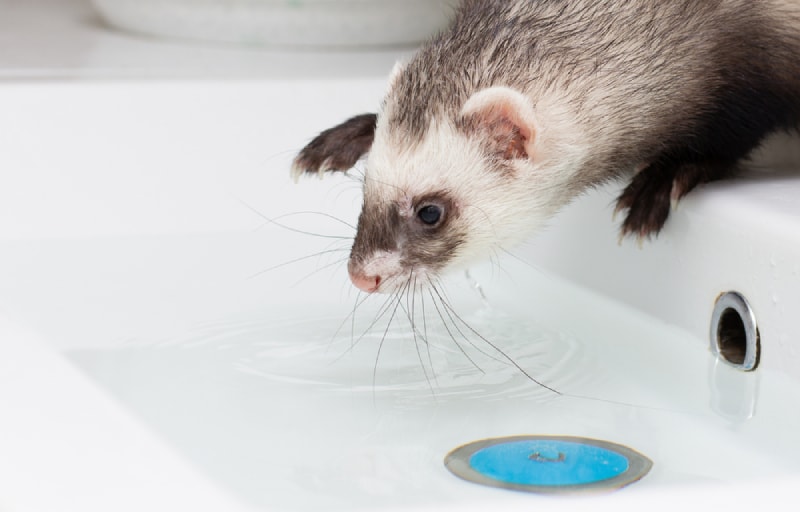How Long Do Ferrets Sleep? Vet-Reviewed Sleeping Habits Explanation
By Ashley Bates
Updated on
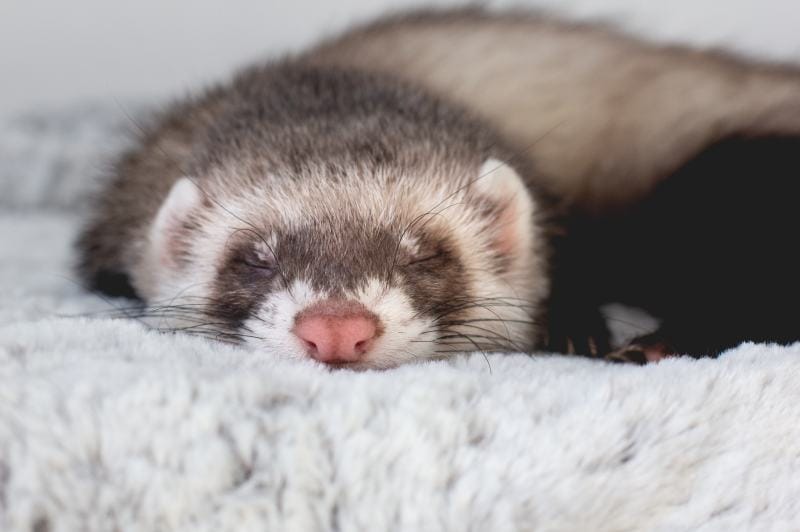
Click to Skip Ahead
To you, it might seem like your ferret sleeps a lot! But do they actually sleep as much as you think? The answer might surprise you. Healthy adult ferrets can sleep anywhere from 18 to 20 hours a day!
If you don’t know much about your ferret’s sleep and wake cycles, read on as we explore their sleep preferences in more detail and provide tips on how you can make your ferret’s nap time more comfortable. After all, snoozing is one of their very favorite activities!
How Long a Ferret Sleeps
It might seem like your ferret sleeps a lot—and they do! Ferrets can sleep 18–20 hours per day. While it might seem like you have a lazy pet on your hands, the reality is that this number of hours is considered normal for them.
Ferrets are neither nocturnal nor diurnal—they are crepuscular. That means your ferret’s most wakeful hours are those around dawn and dusk. Their tendency to be most active at these times makes them fabulous pets for people who have certain lifestyles. For example, if you work full-time and are gone most of the day, it won’t matter much because they’ll snooze most of it away, anyway. That said, ferrets do require regular social interaction, and they definitely require attention from you when you’re home.

How Is a Ferret’s Sleep Broken Up?
Ferrets will likely take several long naps throughout the day and night. If you have ever had a ferret, you know just how much and how hard they sleep. When they are out, it’s hard to rouse them! They usually sleep in clusters of a few hours at a time.
Where Do Ferrets Like to Sleep?
You might notice that your ferret gravitates toward a specific cage area to take their naps. Many of them adore hammocks and hideouts for seclusion and comfort. It’s best to offer multiple options throughout the cage so they can choose their favorite. You can buy all sorts of products online or get creative and make your own!
Another avenue is to explore different DIY options. A few of these options might require purchasing some supplies, but the outcome is still typically less pricey than store-bought options.
Ferrets’ Deep Sleep
Have you ever tried to rouse a sleeping ferret? It’s nearly impossible! When these little guys go out, they sleep like a rock. Typically, you can find a ferret pile, as these little weasels love snuggling while they sleep.
So, ferrets don’t have much interest in playing when they are ready to crash. However, ferrets can also be flexible and acclimate to your schedule. For example, if they’re used to getting out at certain parts of the day, they might naturally start taking naps in between.
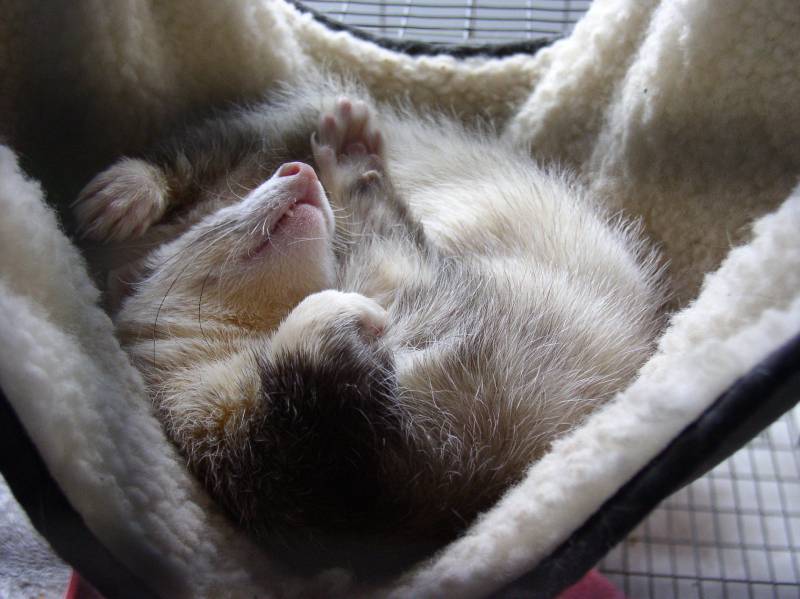
Fun Facts About Ferrets
So, now that you know how long ferrets sleep, what are some other fun facts? These interesting exotic pets have quite different personalities and care requirements than other house pets. Here are a few informational tidbits to know.
1. Ferrets were domesticated about 2,500 years ago.
It’s hard to believe how long ferrets have been around. Initially, they were used to eradicate mice and other small rodents. Today, they’re mostly kept as pets. There has been some discrepancy about the pet industry exploiting these poor animals. They are shipped around to various locations and can become very sick or injured in the process.
Still, even though they have been in the pet trade all this time, they are still banned in certain states and regions.
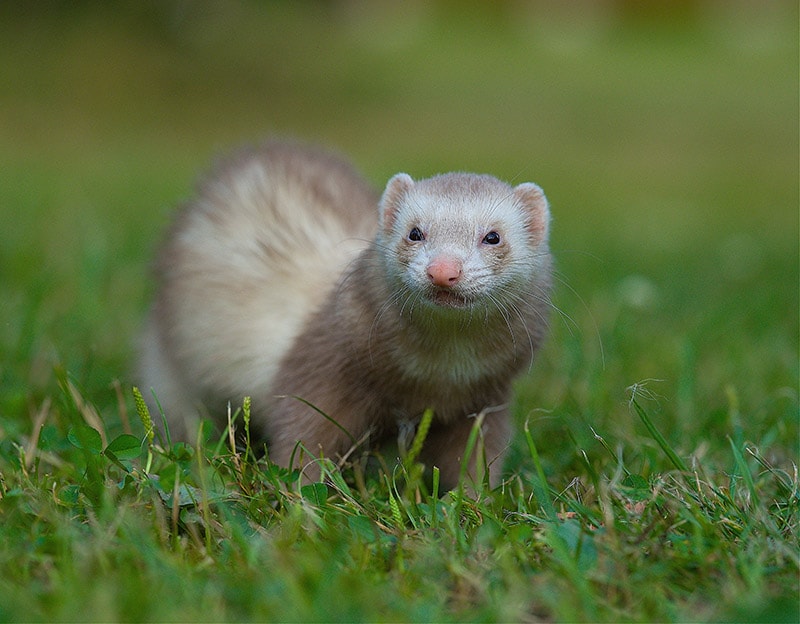
2. Ferrets means “little thief.”
They’re called ferrets for a reason. The word “ferret” is from the Latin furittus, meaning “little thief.” Ferrets are quite sneaky creatures that can steal your belongings. If you already have ferrets or know someone who does, you likely already know that they can steal socks, jewelry, and a slew of other household items and stash them away without your knowledge.
Once you find one of these cubbies, you might find a whole treasure trove of your old belongings you forgot about.
3. Ferrets are crepuscular.
We’ve already mentioned that ferrets are crepuscular, meaning they are most active in the dawn and dusk hours. In the wild, this benefits them for hunting purposes. But how does being crepuscular benefit you?
Ferrets are actually quite ideal pets for people who work long hours. Their human companions are often gone during the day or night but home with them in the evenings and mornings. So, if you have a wonky schedule that keeps you from getting a dog, a ferret might be a fantastic alternative.
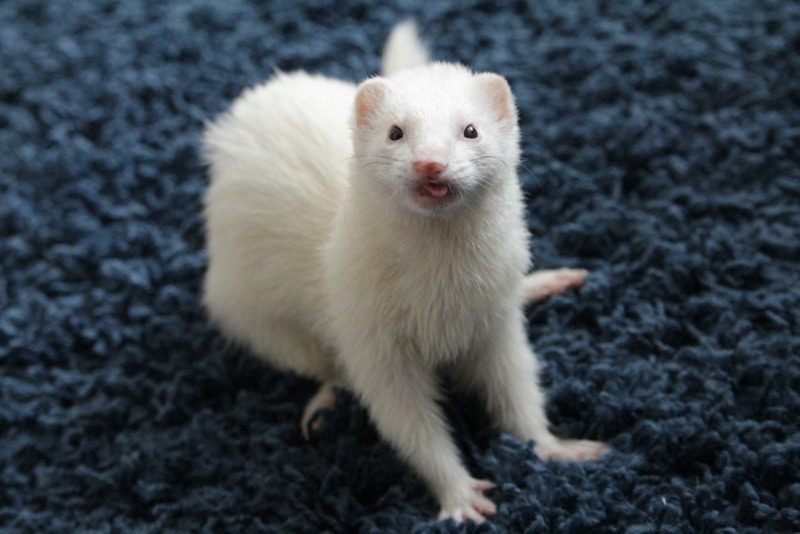
4. Ferrets descended from polecats.
In the United States, there is only one ferret species to exist. It is called the black-footed ferret. You might think that all ferrets in the United States and other countries come from these particular ferrets, but it’s not true.
The domestic ferret actually comes from their wild cousins, European polecats. They were bred down for domestication and remain heavily filtered through the pet trade today.
5. Ferrets have relatively long lifespans for small pets.
The ferret has an attractively long lifespan in comparison to many small pets. Often, a gerbil or rat will live for 2 to 5 years. Ferrets, however, live up to 10 years. So, if you needed another reason to love a ferret, being able to spend more time with them might just be the winner.

Conclusion
Now you understand that ferrets are crepuscular creatures that are awake mostly at dawn and dusk hours. This typically works out for most people, whether you work or have school during the day. These low-maintenance pets will feel content napping for many hours daily and at night. You’ll have lots of time to play otherwise!
That said, when they are awake, they do need to spend ample time outside of their enclosure and require socialization from their caretaker (you!).
See Also:
Featured Image Credit: Irina Vasilevskaia, Shutterstock





